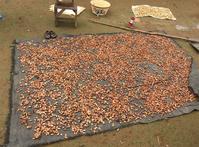Wu-Chen team receives EPA grant
The grant is titled "Development of an Economic Grain Storage System for Rain Season Harvest in Rural Africa". Co-PIs are Wenzhuo Wu, assistant professor of industrial engineering, and Jun Chen, associate professor of mechanical engineering.
"I introduced [Prof. Chen] to our group's research in triboelectric nanogenerators for harvesting raindrop energy," explains Wu, who heads the Wu Group lab. "Dr. Chen has previous experience visiting Cameroon and carrying out EPA projects with the local community. He explained to me that the storage of the harvested grains during the annual rain season in those rural regions is critical yet very difficult where there is no supply of electricity. We thought that our triboelectric nanogenerator technology, hybridized with the solar-thermal drying technology, could potentially address this challenge."
Thirty-one Phase I student teams received grants through the People, Prosperity, and the Planet (P3) Student Design Competition. These teams, made up of college students from across the country, are developing sustainable technologies to solve current environmental and public health challenges. They will present their designs and research findings at the 2018 National Sustainable Design Expo (NSDE) on April 7-9 in Washington, D.C.
The multidisciplinary Purdue student team includes: Ruoxing Wang, a 3rd-year PhD student in industrial engineering; Unmesha U. Kale, a senior in electrical and computer engineering; and Wentao Zhong, a junior in mechanical engineering. They will design and build the prototype, and conduct performance tests by applying the engineering skills they learned in class to solve this real-world problem.
"The students will practice the 'Design for Sustainability' principle by relating the design with all three pillars of sustainability (People, Prosperity, and Planet)," says Wu. "The students will learn about materials processing, nanoengineering, manufacturing, mechanical design, renewable energy, and more across many STEM disciplines."
Wu adds: "We will also promote the sustainability practices by demonstrating this project to both the international and domestic communities. This work will be a substantial contribution to benefit the rural communities in a developing country, will serve as a benchmark and eventually foster long-term collaboration on preventing and reducing food waste between Purdue University and local organizations in developing countries. In our search for sustainable food storage to final deposition, the results of this project will greatly assist decision-makers in both developed and developing countries in considering new local resources for mitigating the global food insecurity."
Next steps for Phase I of the project include demonstrating the prototype at the NSDE in April and at the Purdue Senior Design Expo in May. Students will receive further training during the summer and fall of 2018, form a Global Design Team through Purdue Global Engineering Programs, and implement the project during Phase II in 2019-2020.
ABSTRACT
This project assists decision-makers to considering new local resources for addressing global food insecurity. The team is developing a system powered by solar and hydroenergy for storing harvested grains during rainy seasons in rural regions of Africa. This system can be implemented in domestic rural areas facing similar situations during harvest season. Grain processing can be an environmentally taxing procedure and this new storage system can improve air quality by reducing the gas emissions typically released during conventional grain processing.
Writer: DeEtte Starr, starrd@purdue.edu
https://www.epa.gov/newsreleases/epa-awards-grants-31-college-teams-innovative-technology-projects



